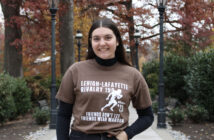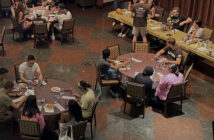Lehigh’s campus is known for its numerous stairs and hills, which often pose difficulties for students with mobility-related issues.
Cheryl Ashcroft, assistant dean of Academic Support Services for Students with Disabilities, said Lehigh is accommodating to students who are injured, handicapped or who have disabilities. Ashcroft said the office works closely with students who come to Lehigh with a disability, such as a wheelchair or prosthetic leg, to ensure their classes and residence halls are accessible.
For those who sustain injuries or who have surgeries that force them to use crutches, Ashcroft says the office helps find the most appropriate form of transportation to help.
Ashcroft also said some students are eligible for a medical parking permit, while others will receive assistance from friends or Transportation Services.
Most of the academic buildings on campus are suitable for students with mobility-related issues. There are some exceptions, like Christmas-Saucon Hall, an older building with a structure that prohibits it from having an elevator. If a student is already registered in a course in an older building and becomes injured, the entire class will be moved to an alternative location, Ashcroft said.
Academic Support Services for Students with Disabilities also works closely with Residential Services to house incoming students with disabilities in a residence hall that is accessible to them.
“However, if a student sustains a temporary injury during the semester, we will offer them the option to move to other residential accommodations in buildings that are more accessible,” Ashcroft said.
When it comes to building renovations, Ashcroft said the Americans with Disabilities Act requires new structures to be built to meet federal standards of accessibility. She said Lehigh is always working to improve the accessibility of its buildings. For example, the Committee on Transportation and Accessibility has been working on projects to provide more direct routes to classes for all students.
Devon Gallagher, ’16, has been using a prosthetic leg since she was four because of a congenital bone disease that required her foot to be amputated. Before she arrived at Lehigh, Gallagher reached out to Ashcroft.
“She was more than helpful in planning my future Lehigh career,” Gallagher said.
Gallagher said she worked closely with Ashcroft and Residential Services to live in a medical suite in Dravo House her first year, which included a kitchenette and private bathroom.
“Lehigh does everything in its power to be as accommodating as possible to students with disabilities… it’s hard since the campus is on a mountain,” Gallagher said. “The stairs are extremely difficult to maneuver in the winter, especially when it’s icy, but professors are generally understanding if I shoot them an email before class telling them it’s too risky for me to try to make it to class when there’s so much ice on the ground.”
Last winter, Gallagher fell and broke her foot while walking down stairs on campus. She said that, within a week, Lehigh made as many temporary renovations as possible to potentially dangerous areas and ultimately redid them over the summer.
“Reach out to Cheryl Ashcroft in Disability Support Services,” Gallagher recommended to those in a position similar to her own. “She has game plans for almost any situation and will help you figure out your options. Also, it’s good to shoot an email to professors to let them know your situation.”
Josh Perlmutter, ’17, recently became injured while at Lehigh and is now on crutches.
“The bus system is great here, but since the buses don’t drop you off at the exact location you want to go to, it makes it very difficult for disabled students to take the bus,” he said.
As for academic buildings, Perlmutter’s classes are mainly in Rauch Business Center throughout the day, and he said he is fortunate that Rauch is equipped with an elevator to minimize the amount of stairs he has to climb throughout the day.
Many other students have experienced difficulty when dealing with an injury on campus, including Stewart Dix, ’16. Dix was on crutches at Lehigh for three weeks and lives on the fourth floor of a fraternity house with no elevator.
“My injury was relatively mild, and I was able to walk on my foot when I needed to, but there are two guys in the house on crutches now that cannot put any pressure whatsoever on their injured foot/leg,” Dix said. “The stairs are a huge hassle for those guys.”
Dix advised injured students to take advantage of the accommodations Lehigh offers to students, such as a temporary handicap parking pass.






Comment policy
Comments posted to The Brown and White website are reviewed by a moderator before being approved. Incendiary speech or harassing language, including comments targeted at individuals, may be deemed unacceptable and not published. Spam and other soliciting will also be declined.
The Brown and White also reserves the right to not publish entirely anonymous comments.